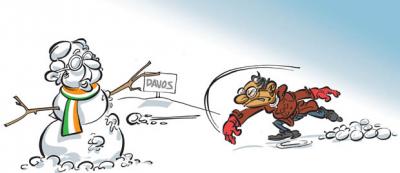Much has been said about the exasperation of the Prime Minister when he discussed with the Indian Minister of Finance the vexed issue of Double Tax Avoidance Treaty.
The two governments have been engaged in negotiations for several months. It goes without saying that each side will defend its stand and prevail on the other side to make compromises or even new deals. In essence, the Indian side wants to review some of the provisions of the Treaty as it contends that it is losing revenue through the laxity of our offshore sector vis-à-vis Indian offshore companies doing business here. Mauritius defends the position that its offshore sector is clean and transparent and is backed by modern legislation and reliable financial institutions. It pleads for a status quo in respect of the Treaty and argues that the amendments contemplated by the Indian side would severely hurt its offshore sector and entail loss of revenue and jobs.
The Mauritian stand has been explained to the Indian government at various levels. Our Foreign Minister, Finance Minister, Prime Minister and even our President have on different occasions broached the subject with their Indian counterparts and they have come back, satisfied with the assurance given by the Indian government that ‘nothing will be done which will hurt Mauritius’. The two sides then agreed to hold negotiations (Joint Working Group) at the level of officials to look into the nitty-gritty. Several rounds of negotiations have produced no tangible results. Consequently, the Damocles sword is still hanging on our offshore sector. When we examine closely the assurance given by the Indian government we should read in between the lines and understand that, in the first place, the Indian government is bound to do nothing which will hurt its own interests.
The Indian press has been quite bitter in its articles on alleged flaws in our offshore sector. However, during the negotiations, each side has the duty to defend its stand not by the force of its muscles or invectives, but by solid arguments and innovative proposals to avoid any stalemate. The population of Mauritius understands that and backs the government in these negotiations. Ahead of the next round of negotiations, the Prime Minister did the right thing to exchange notes with the influential Indian Finance Minister, Mr P. Chidambaram in Davos. From experience, we know that such exchanges are friendly as both sides, supported by historical bonds and decades of meaningful collaboration, will find ways and means to reach a solution in a spirit of mutual understanding. So, what went wrong in Davos ?
A couple of days after the high level meeting, the Indian government unilaterally announced the postponement sine die of the following round of negotiations. That came as a bombshell to the Prime Minister In Davos and also to the Mauritian population. Local politicians commented on that unexpected development. Some backed the Prime minister for his strategy while others, including two former Prime Ministers, blamed him for mishandling the issue with Minister Chidambaram.
I have a different reading of the situation. As a patriot and a former Head of the Ministry of Foreign affairs, I need to support the Prime Minister when he defends the vital interests of Mauritius. On the dossier itself there is no problem, but the blunder lies elsewhere. Nobody, apart from a few close collaborators, would have known what happened inside the room where the Prime Minister met Minister Chidambaram. How were we informed ? By the Prime Minister himself. By contrast, the Indian side kept quiet. On the local radio, the Prime minister gave a fairly detailed account of how he expressed his exasperation to Minister Chidambaram, and how he did not mince his words to make Chidambaram understand how he was unhappy with the state of negotiations carried out with Indian Finance Ministry officials. The Prime Minister’s statement was broadcast several times on the radio here. Thinking that he was speaking exclusively to the Mauritian population, the Prime Minister dwelled enthusiastically on the manner he put his views across to Chidambaram. Strangely enough, he gave me the impression of acting like King Kong, stumping repeatedly his chest to show that it was the strongest. The Prime Minister did not realize that his statement, though in creole, would be relayed to New Delhi. His college boy behaviour must have profoundly disturbed and irritated the highest echelons of the Indian government which decided to strike a blow by postponing sine die the negotiations. Who will pick up the pieces now ? Are we in a stronger position, Prime Minister ? Your cronies will surely applaud you and heap a lot of cheap credits on you.
Diplomacy has many doors and windows. One should learn how to use them.
Diplomatic blunder in Davos
- Publicité -
EN CONTINU ↻
- Publicité -

